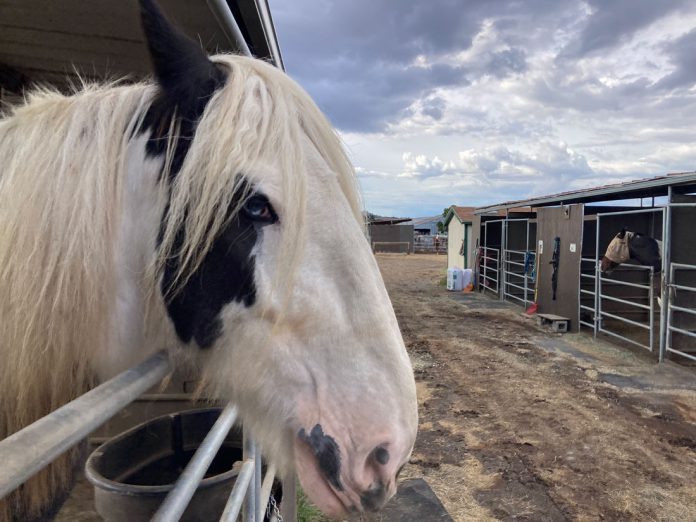
Horse owners, ranchers and agricultural advocates are sounding the alarm over proposed zoning amendments they say could force hundreds or more horses out of Santa Clara County and devastate an industry woven into the region’s rural heritage.
The controversy centers on draft zoning ordinance amendments that would reclassify horses to no longer be considered “livestock,” a classification that allows large animals to be considered part of agriculture and therefore permitted in exclusive ag zones.
Tyler Flippo, who has boarded horses in Coyote Valley for more than 10 years, said he learned about the proposed changes only recently and immediately recognized the threat to his livelihood.
“This proposal doesn’t just threaten my business; it threatens hundreds of horses and the families who care for them,” Flippo said. “If horses are pushed out of agriculture zoning, they could be displaced into unsafe living situations and an important part of our rural heritage will be lost.”
The proposed Rural Zoning Amendments, presented to the Planning Commission in August, aim to modernize the county’s aging zoning ordinances and preserve the region’s rural heritage by establishing new building limits and requiring mitigation when farmland is converted to non-agricultural uses, according to county staff. But it’s the specific exclusion of equine operations that has horse owners mobilized.
“Whether they want to say that they’re pets or not, they’re going directly against state and U.S. codes that define horses as livestock,” Flippo said. “It shines a bad light on our county that they are trying to do this. It really would set a bad precedent, I think, for the rest of the counties in California.”
The implications extend beyond semantics. Agricultural classification provides tax exemptions that horse operations rely on. Without agricultural status, existing stables could face costly compliance requirements or closure. Flippo estimates about 1,500 horses could be displaced if the amendments proceed as drafted.
“Where do they go?” Flippo asked. “Down to Hollister, where it is allowed? Or are they going into peoples’ back yards, which is totally not good for the neighborhood, with the flies and manure problems?”
A critical uncertainty remains around how existing equine operations would be handled under the new rules, especially those currently struggling with the county’s existing permitting processes.
Permit problems
At a public outreach meeting conducted remotely on Oct. 7, county officials emphasized that existing operations that are in compliance with current zoning would be grandfathered in. However, Flippo said that the majority of horse facilities lack the use permits required under existing regulations due to the county’s difficult permitting process.
“From what we can find out, nobody has been able to get a use permit for stables in the last 25 years,” Flippo said. “To get a use permit, they estimate it costs $100,000-$200,000 by the time you’re done. It’s unreasonable. We don’t make very much money.”
County officials have discussed an amnesty program for agricultural uses not in compliance, though details remain unclear. County Planning Director Jacqueline Onciano said the county wants to work with businesses to bring them into compliance rather than shut them down, noting many operators may not fully understand current code requirements.
“We’re not looking to shut down any businesses, but we have to take note on a case-by-case basis,” Onciano said. “It’s not an easy answer, but we do want to work with businesses so that we can bring them into compliance if they’re out. We’re going to continue to have that conversation. There is not an easy answer, because each business is operating differently.”
A change.org petition opposing the amendments has gathered more than 2,500 signatures as of Oct. 14, with organizers urging county officials to “maintain recognition of horses and equine operations as agriculture in all zoning ordinances, and protect existing facilities from arbitrary reclassification that would harm small businesses, animals and the community.”
Patrick McGarrity, Supervisor Sylvia Arenas’ District 1 director of policy and budget, told meeting attendees that “these are still in draft form, and these will not be finalized without your input and Board of Supervisors approval.”
Speaking for Arenas, McGarrity said, “As the supervisor representing the majority of these unincorporated and agricultural lands, small farms, farm stands, ranches, wineries and more, Supervisor Arenas wants to make sure that these updates are rooted in respecting the daily needs of our rural community.”
The equine community’s concerns mirror objections raised by winery operators, religious organizations and other rural business people, who warned the changes could force closures through costly compliance requirements.
“I am at the spearhead of the horse issue, but I am also a farmer and connected with other farmers, and what is happening to the small farms and small wineries is tragic,” Flippo said. “Not one single farmer should be put out (of business) by this.”
After meeting with the South County Farms Association, a coalition of small farmers united for advocacy, Flippo claimed that the group estimated 80-90% of small farms in the affected areas would be forced to close.
The public outreach period for the draft amendments continues through October, with the final meeting, focusing on golf courses and country clubs, scheduled for Oct. 20. The amendments are expected to reach the board of supervisors for approval by December.
For more information on the county’s project to overhaul its rural zoning ordinances, visit https://tinyurl.com/5hap6bsv.














I’m sure there are friends of the rulers who will step in, after the present owners lose their businesses.
How is this even legal? The federal government sets definitions of what an animal is and that’s important for a variety of reasons, including interstate commerce. And according to Federal Regulation 780.328 “Meaning of Livestock” you find…oh wait for it…horses on that list. You can’t just reclassify animals at a county level because you’re trying to make a land and money grab. If the county follows through on this, I hope they are sued into oblivion. Also, horses have been an integral part of California agriculture for centuries, and it’s infuriating and insulting that the county would try to legislate away that rich history. The red tape and prohibitive costs to zoning permits are also outrageous. Small farms are still very much part of the backbone of the State of California and I’m ashamed of the county representatives that are trying desperately to sanction them out of existence.